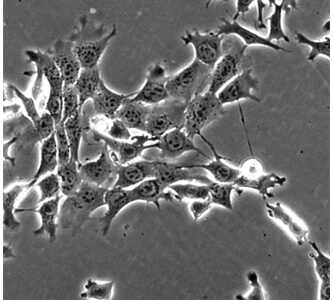Angelina Jolie's brave act is still in the headlines, while new research takes the fight against cancer another step forward. Researchers have developed a chip for quick and accurate detection of breast cancer, which in the future may also detect other types of cancer
By Ido Gnot, Galileo
Researchers from the Lucerne Institute of Technology in Switzerland (EPFL) have successfully developed an innovative chip that enables efficient identification from a sample of the exact type of breast cancer - within a few minutes, with a high level of certainty and with very few inconclusive results.

In Israel, the incidence of breast cancer has been on the rise in recent years. A report published by the Ministry of Health in 2012 indicates that one out of every 7.5 women will develop breast cancer, and that Israel ranks fifth among Western countries in the incidence of the disease. However, early detection (and no less important than that - accurate identification of the type of cancer) has been proven to save lives, and in recent years there has been, happily, a decrease in death rates from the disease in Israel.
From the data of the Ministry of Health there is also another disturbing figure regarding breast cancer: diagnosed patients have a 25% higher risk of developing another cancer, compared to women without breast cancer. In an examination conducted by the ministry between 1991 and the middle of the last decade, it was discovered that out of 44,773 women who were diagnosed with breast cancer, 3,707 (8%) were later diagnosed with another cancerous growth other than breast cancer. The cumulative risk of another cancer even increased ten years after the initial diagnosis and reached 10%. These data only reinforce the importance of quick and accurate initial detection of breast cancer.
A chip saves lives
The researchers from the Lucerne Institute have developed a microfluidic chip, which is made of silicon and glass and contains tubes containing a solution, capable of analyzing a tissue sample (taken as a biopsy from the patient). The chip is able to detect abnormal amounts of the HER2 protein found on the surface of cancer samples, thus helping to accurately determine the unique type of breast cancer from the sample.
The chip consists of tiny tubes arranged in a grid pattern. The width of each tube is only 100 microns, and the structure can be compared to a tiny irrigation system. The suspect sample from the patient is inserted into the chip, which uniformly "waters" it with a special solution that includes antibodies designed to attach to the HER2 protein and enable its detection.
The test methods used today require prolonged soaking of the sample in an antibody "bath". As a result of this action, the antibodies sometimes stick to areas where there are no target proteins, and wrong or inconclusive results are obtained, which necessitates the use of expensive and complex complementary genetic tests. The new chip almost completely saves these tests by means of a short and uniform soaking of the entire sample.
The results obtained so far in the laboratory experiments with the new chip are quite promising. Out of 76 samples tested using the existing technology, no less than 26 came back with inconclusive results. In contrast, the prototype of the new chip managed to achieve a significantly better result with the same samples - only 3 of the 76 samples came back with inconclusive results. All other results were found to be accurate, within a few minutes.
The researchers said that although the current experiment was conducted to detect the HER2 protein, it is possible to adapt the chip to detect additional proteins (and other types of cancer), which may make it a particularly effective tool in the effective, fast, accurate and cost-effective diagnosis of a wide variety of cancers. The research team is currently engaged in the commercialization of the technology.
About the author:
Starting in the late 90s, Ido Ganot wrote and edited a series of websites and online magazines on science and technology; Lover of technology and science and has been involved in these fields for many years, both as a journalist and as an academic. Doctorate in the philosophy of science at the Hebrew University, in which he won the Bar Hillel prize for the philosophy of science in 2006. Since 2007 he serves as an honorary member of the management of the Lifeboat organization along with a long list of thinkers and academics.
Currently serves as the editor of the Israeli photography website mega pixel
...

2 תגובות
I did not find such an institute in Lucerne. Maybe in Lausanne? Why is there no comment on the source?
Hello father
It would be interesting to have a series of articles on subjects in the field of science, medicine, etc., on which there are differences of opinion among the researchers, scientists, etc.